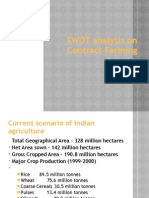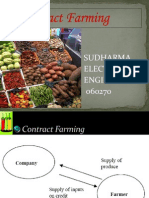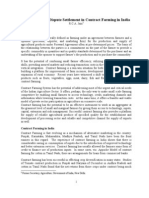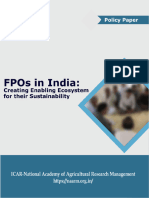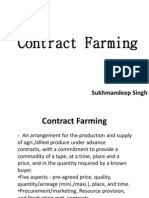Contractfarmingarticle 2 7
Contractfarmingarticle 2 7
Uploaded by
nishidangi0Copyright:
Available Formats
Contractfarmingarticle 2 7
Contractfarmingarticle 2 7
Uploaded by
nishidangi0Original Title
Copyright
Available Formats
Share this document
Did you find this document useful?
Is this content inappropriate?
Copyright:
Available Formats
Contractfarmingarticle 2 7
Contractfarmingarticle 2 7
Uploaded by
nishidangi0Copyright:
Available Formats
Food and Scientific Reports
ISSN 2582-5437 foodandscientificreports.com
Problem and Prospect of contract Farming in India
Ramnath K. Ray1, Meera Kumari2, Puja Sinha3, Ashish Umrao4 and Subhransu Nayak5
1
Senior Research Fellow, ICAR Research Complex for Eastern Region, Patna, Bihar; 2Jr.Sc cum-Asstt. Professor, Department of
Agricultural Economics, BAU, Sabour, Bihar; 3Research Scholar, Department of Agricultural Economics, BAU, Sabour, Bihar; 4Research
Scholar, Sardar Vallabhbhai Patel University of Agriculture & Technology, Meerut, UP, 5M.Sc. Student, Department of Agricultural
Economics, BAU, Sabour, Bihar.
ABSTRACT
The future of contract farming in India is quite promising due to increasing consciousness about food safety and quality
among the rising middle-class population and the quality demands of the export market in the developed countries. The major
problems include farmers selling to a buyer other than the one with whom they hold a contract, or using inputs supplied by
the company for purposes, on another side, a company sometimes fails to buy products at the agreed prices or in the agreed
quantities or arbitrarily downgrades produce quality. The existence of an adequate legal framework is thus crucial for the
successful implementation and long-term sustainability of contract farming operations. It is becoming an increasingly
important aspect of agri-business, whether the products are purchased by government agencies, multinationals companies,
smaller companies, farmer cooperatives or individual entrepreneurs. Therefore, before introducing new cropping practices,
sponsors should also consider social attitudes and have to judge how a replacement crop could also be introduced. Currently,
contract farming requires registration with the agricultural produce marketing committee (APMC) in a few states. It is also
working on the promotion of FPOs to mobilize small and marginal farmers to opt for the regulatory measure of the act. The
Ministry of Food Processing Industries of Government of India has launched a scheme entitled 'Grant under Backward
Linkages' to promote contract farming. Under this scheme, a grant of 10 per cent of the value of raw material purchased from
the contract farmers (subject to a maximum of Rs.10 lakhs per annum) is provided to food processing units up to three years.
Contract farming is involved mostly in cash crops which may lead to a shift in the area from food crops which, beyond a
limit may endanger food security, biodiversity and crop cycle of the country is a major weakness of contract farming. The
government is increasingly looking towards the corporate sector to augment rural incomes and employment through agro-
processing. In this context, policy makers see the contract farming/marketing as an important avenue to ensure greater private
sector participation in agriculture.
Keywords: Contract Farming, Model act.
Contract Farming was introduced in Taiwan for agencies with a minimum support price (MSP). The
the first time in 1895 by the Government of Japan. In Model Agricultural Produce Marketing Committee
India, Contract Farming has its historical roots from the (APMC) development &Regulation Act disseminated by
time when the Europeans first introduced opium and the central control to the States in 2003 for implementing
indigo cultivation within the Bengal Region, beneath the marketing rebuild up, has provisions for the registration
East India company regulation. In Andhra Pradesh, year of contract farming sponsors and write down of farming
1920s, The ITC’s contracted with farmers for growing agreements with the Agricultural Produce Marketing
Virginia tobacco. In 1927, PepsiCo did contract farming Committee (APMC) or a prescribed power under this
for the cultivation of vegetables particularly potatoes and Act, safety of title or rights of the farmers over the land
tomatoes in Hoshiarpur Taluk of Rajasthan. Emergence beneath such contracts, disagreement decision device and
of seed companies during the 1960s, the green revolution a model draft agreement suggesting such various
during the 1970s and finally the tomato farming contracts conditions. To help States within the formulation of rules
during the 1990s by PepsiCo in Punjab can be rehearsed during this regard, the Ministry of Agriculture has also
as a number of the milestones within the emergence of spread a group of Model APMC Rules to them for
contract farming in India. Several cash crops like rubber, implementation. By now, related provisions have been
tea, coffee, etc. are introduced in various parts of India, made by numerous state governments in their particular
mostly through a central expatriate owned estate APMC Acts for providing a legal structure to farming. In
surrounded by a small out grower's model. Since the India, by the corporate sector Contract Farming has been
green revolution, the Central Government started the so far more of a case of buyback and input supply, except
foremost essential Contract Farming system, through for some exceptions in states like Punjab, where the state
which it fertilizer and pesticide subsidized, provided new is actively involved in some of the contracts.
hybrid high yielding seeds, provided skill training and
also guaranteed the procurement by state government
August 2020 │Volume: 1, Issue: 8│Page 63
Food and Scientific Reports
ISSN 2582-5437 foodandscientificreports.com
What is Contract Farming livestock or its product of contract farming producer as
Contract farming or marketing essentially is an per contract.
arrangement between the farmer producers and the agri- Contract Farming Facilitation Group (CFFG) for
business firms to produce certain pre-agreed quantity and promoting contract farming and services at the
quality of the produce at a particular price and time. It village/panchayat level provided.
can only be a pure procurement transaction or can extend The accessible and straightforward mechanism at the
to the supply of inputs or even beyond. It is emerging as root bottom possible provides for quick disposal of
an important mode of procurement of raw materials by disputes
agri-business firms in India due to the development in the
field of agricultural marketing, changes in food habits Model of contract farming
and agricultural technology in the new economic Centralized model: The contracting company provides
environment. This is an important initiative for reducing necessary support to the farmers for production of
transaction costs by establishing farmer-processor required crops; purchases the crop from the farmers, and
linkages in addition to the already existing methods of then packages and market the product by tightly
linking the farmers to the consumers. controlling its quality, this type of farming is quite
famous in developing countries for high value crops such
Existing regulatory structure as tobacco, cotton, banana, coffee, tea, cocoa, or rubber
Currently, contract farming requires registration with etc.
the agricultural produce marketing committee (APMC)
in a few states.
Market fees and levies are paid to the APMC to
undertake contract farming
Model APMC Act 2003 motivated 14states to notify
rules on Contract farming
Model Contract farming Act 2018
The act lays special emphasis on protecting the
interests of the farmers, considering
Nucleus estate model: Company owns and manages as
Also, services contracts right along the worth chain
estate plantation to ensure the limited guarantee of
including pre-production, production and post-
required output. This model of contract farming is
production are included.
extremely used for tree crops such as palm oil etc. and
‘‘Registering and Agreement Recording Committee’’
occasionally used in case of send abroad of fresh
or an ‘‘Officer’’ for the aim at district/block/taluka
vegetables.
level for online registration of sponsor and recording of
the agreement provides.
Contracted produce is to be covered under
crop/livestock insurance in operational.
Contract farming to be outside the ambit of the APMC
Act
No permanent structure are often developed on farmers
land/premises
No right title of interest of the land shall vest within the
sponsor.
Promotion of FPOs to mobilize small and marginal Multipartite model: It's a common joint venture
farmers has been provided. approach in between statutory bodies or state agencies
FPO/FPC is often a contracting party it so authorized and private companies; those are jointly participating
by farmers. with farmers. The multipartite arrangement may include
No rights, title ownership or possession to be different specialized organizations for purpose of credit
transferred of 1 or more of agricultural produce, provision, processing, distribution or marketing etc. Ex;
in Mexico, Kenya and West Africa.
August 2020 │Volume: 1, Issue: 8│Page 64
Food and Scientific Reports
ISSN 2582-5437 foodandscientificreports.com
Informal model: It usually includes small entrepreneurs The intermediaries normally enter into informal contracts
or companies who enter into informal contracts with with farmers to meet the obligations beneath formal
farmers on a seasonal basis which mainly includes crops contracts with corporate. This is often a standard follow
like fresh vegetables or tropical fruits etc.
in the south-east Asia region.
Some states are specials for a particular product
Intermediary model: Under this model companies
and corporate dealt under contract farming are mentioned
make formal sub-contract with intermediaries (like
in table 1
agents, farmers groups or NGOs) for production of crops.
Table1: Area under contracting farming in different states of India
States Corporates Crops Area (ha)
Punjab NIJJER Agro Foods Ltd. Tomato and Chilli 250
United Breweries Ltd. Barley 2270
PepsiCo India Ltd. Basmati, Groundnut, Potato and Chilli 6000
Nestle India Ltd. Milk 650 lakh kg/day
Satnam Oversease, Sukhjit Starch Basmati and Maize 4000
Satnam Oversease, Amira Indian Basmati 14700
Foods Ltd.
Madhya Pradesh Cargil India Ltd. Wheat, Maize and Soybean 17000
Hindustan Lever Ltd. Wheat 15000
Ion Exchange Enviro Farms Ltd. Several Fruits, Vegetables, Cereals 12098
and Pulses
ITC Soybean 1200
Maharashtra Tinna Oil and Chemicals Soybean 154.800
Ion Exchange Enviro Farms Ltd. Several Fruits, Vegetables, Cereals 19
and Pulses
Karnataka Himalaya Healthcare Ltd. Ashwagandha 700
Mysore S N C Oil Co. Dhavana 400-500
AVT Naturals Products Ltd. Marigold and Caprica Chilli 4000
Natural Remedies Pvt. Ltd. Coleus 150
20 Pvt. Co. Gherkins 8000
Tamil Nadu Super Spinning 570 Mills Cotton 570
Appachi Co. Cotton 260
Bhuvi Care Pvt. Ltd. Maize and Paddy 1000
Source: Satish, 2012, Kadrolkar, 2016
The firms do not pay heed as the cost of such effects
Environmental impact of contract farming
are externalized so for as the firm is concerned
Contract farming results in monocultures which cause
It is additionally argued that contract farming a part of
depletion of quality of soil and fertilizers and pesticides
the globalization process might cause increasing
effect on natural recourse, environment, humans &
investment in developing countries that have low
animals.
environmental standards and thus the resource base
It leads to exploitation of groundwater is over, soils
might end up irreversibly depleted or broken.
salination. The decline in soil fertility, and pollution
August 2020 │Volume: 1, Issue: 8│Page 65
Food and Scientific Reports
ISSN 2582-5437 foodandscientificreports.com
The main advantage of a contract for farmers is that more politically expedient for a sponsor to involve
the sponsor can ordinarily in agreement to purchase all smallholder farmers in production instead of to control
produce grown, within the particular quantity and quality plantations.
parameters. Contracts also give a chance for farmers to
access a wide range of managerial, technical and (ii) Overcoming barriers on land restrictions: In
extension services, etc. present days most of the large tracts of suitable land are
either traditionally owned, costly to purchase or
(i) Provision of better inputs and production services: unavailable for commercial development. Contract
It is also to the supply of basic inputs such as seeds and farming, therefore, offers access to crop production
fertilizers. Sponsors may also provide facilities such as farmland that will not well be available to a corporation,
land preparation, field cultivation and harvesting as well with the extra advantage that it does not get to purchase
as free training and extension services to the farmers. it.
(ii) Easy access to Credit: Contract farming sometimes (iii) Production consistency and shared risk: Working
allows farmers access to some type of credit to finance with contracted farmers facilitates sponsors to share the
production inputs. Arrangements can also be made with risk of production failure because of the poor weather,
commercial banks or government agencies through crop disease, etc. Both estate and contract farming strategies
loans that are guaranteed by the sponsor, i.e. where the of getting raw materials are significantly more reliable
contract serves as collateral. than making purchases on the open market.
(iii) Application of better technology: Private agri- (iv) Quality assurance: Steady markets for fresh and
business will usually offer technology more processed agricultural produce need reliable quality
conscientiously than government agricultural extension standards. Contracted crop production and estate both
services because it has a direct economic interest in require close management to regulate and maintain of
improving farmer’s production. quality of products, mainly when farmers are adopting
new harvesting and grading methods.
(iv) Improvement in skills of the farmers: Farmers will
gain experience in carrying out field activities following Problems of contract farming
a strict timetable imposed by the extension service. The potential issues as confronted by the farmers
Farmers ordinarily apply techniques introduced by because of Contract Farming are given.
management (seed and fertilization, transplantation, pest
and disease control, etc.) to other cash and subsistence (i) Possibility of greater risk: Farmers who were
crops. entering into a new contract farming venture ought to
prepare themselves to assess the prospect of higher
(v) Guaranteed Pricing System: Farmers receive return returns against the possibility of larger risk. There might
an open market depends upon the predominant market be production risks, particularly where prior field tests
prices further as on their ability to discount with are inadequate, leading to lower-than-expected yields for
consumers for their crops. the farmers. Market risks might occur once when the
company’s forecasts of market size or price levels aren`t
(vi) Easy access to reliable market: Contract farming accurate
offers a possible solution to the present situation by
providing market guarantees to the farmers and insuring (iii) Outdated technology and crop incongruity: The
supply to the traders. Even wherever there are existing introduction of a new crop to be fully grown under
shops for similar crops, contract farming can offer conditions particularly controlled by the sponsor will
considerable advantages to farmers. disrupt the present farming system. On the other hand,
the introduction of advanced machines (e.g. for
Advantages for sponsors: transplanting, harvesting) might lead to a loss of local
(i) Political Acceptability: Contract farming, particularly employment and overcapitalization of the contracted
when the farmer is not a leaseholder of the sponsor, is farmer.
less likely to be subject to political criticism. It can be
August 2020 │Volume: 1, Issue: 8│Page 66
Food and Scientific Reports
ISSN 2582-5437 foodandscientificreports.com
(iv) Manoeuvring in quotas and quality specifications: Governments have sometimes fallen victim to dubious or
Incompetent management will lead towards production "fly-by-night" corporations who have seen the chance for
exceeding original targets eg. failures of field employees a quick profit.
to see fields following transplanting may result in gross
over planting. Sponsors can also have unrealistic The possible problems as confronted by the Contract
expectations of the market for their products. Farming Developers are as below
(i) Limitation on land availability: Difficulties may be
(v) Corruption: Problems occurs when employees arising when sponsors lease land to farmers. Several
responsible for issuing contracts and buying crops taking contract farming ventures are dominated by customary
undue advantages of their position. In a large contract, land practice arrangements negotiated by landless
the sponsors will themselves be dishonest or corrupt.
farmers with traditional landowners. Before signing a enables the farmer to learn new skills of farming which is
contract, the sponsor should make sure that access to land responsible for the production of quality and quantity
is secured, for a minimum term of the agreement. product. It also helps in reducing price risk problem as
the prices of commodities are already fixed in advance.
(ii) Social and Cultural constraints: In communities The Ministry of Food Processing Industries has launched
where custom and tradition play an important role, 'Grant under Backward Linkages' a scheme for promotion
difficulties might arise when innovative farming is of contract farming. Under this scheme, a grant of 10 per
introduced. Hence, before introducing new cropping cent of the value of raw material purchased from the
practices, sponsors should consider the social attitudes contract farmers (subject to a maximum of Rs.10 lakhs
and the traditional farming procedures of the community per annum) is provided to food processing units up to
and judge how a new crop may be introduced. three years. Therefore, to overcome declining
productivity and falling farm incomes, contract farming
(iii) Below-quality agro-inputs: The majority of farmers is the best alternative. It is also an important initiative for
adapt to the agreement once they have the data that reducing transaction costs by establishing farmer-
contract has the benefits of technical inputs, cash processor linkages in addition to the already existing
advances and a secure market. However, until a project is methods of linking the farmers to the consumers.
very poorly managed, input diversion is typically an Conclusions and implications
infuriation rather than a serious problem. Contract farming is one of the possible solutions
to establish an agrarian economy that ensures food and
(iv) Sale of crops by the farmers beyond contractual nutrition security to a billion populations. It is a viable
agreement: This happens when non-contracted farmers alternative farming model in India, which can provide
take benefit of higher prices paid by a well-known assured and reliable input services to the farmers and
sponsor. Non-contracted crops are filtered into the desired farm produce to the contracting firms. It also
purchasing system by external farmers through friends facilitates backward and forwards market linkages that
and family who have crop contracts. Such types of are the foundation of commercial agriculture specially to
practices make it difficult for the sponsor to regulate solve many of the market access problems for small
production targets, chemical residues and many other farmers. The contracting firms must consider physical
quality aspects. infrastructure, telecommunications infrastructure, land
availability and tenure, input availability, and social
Prospects of Contract Farming considerations However, in the present context; for both
With the growing population, the demand for the companies and the farmer's contract farming is a win-
food products is increasing day by day which will only win situation. The prospects of contract farming in India
fulfil when supply meets the demand but in our country is fairly encouraging due to increasing consciousness
due to lack of technical and technological knowledge and about food safety and quality among the rising middle-
also the financial scarcity of farmers, the supply does not class population and the quality demands of the export
meet out the demand. Thus, to overcome from this market in the developed countries. Contract farming
problem, contract farming is the best solution as it offers a possible solution to the present situation by
provides high yielding variety (HYV) seeds, labour, and providing market guarantees to the farmers and insuring
machinery and also introduces new technology that supply to the traders. Even wherever there are existing
August 2020 │Volume: 1, Issue: 8│Page 67
Food and Scientific Reports
ISSN 2582-5437 foodandscientificreports.com
shops for similar crops, contract farming can offer Kumar, J and Prakash, K. 2008. Contract Farming:
considerable advantages to farmers. It is also an Problems, Prospects and its Effect onIncome and
important initiative for reducing transaction costs by Employment. Agricultural Economics Research
Review 21, 243-250
establishing farmer-processor linkages in addition to the
Manjunatha A.V,ramappa K.B, lavanya B.T, and
already existing methods of linking the farmers to the mamathaN.C, (2016), Present Status and Prospects
consumers. Therefore, the government should establish a of Contract Farming In India. International
monitoring mechanism and a dispute settlement body to Journal of Agriculture Sciences, 8(7), 1072-1075.
ensure that both parties adhere to the terms of the Satish, H.S. (2012) Nature and Scope of Contract
contract. Farming in India.www.slideshare.net/.../natureand-
scope-of-contract- farming- in- India
References Kadrolkar, V.M. (2016). An Empirical Study on Contract
Chakrabarti, M. 2015. An Empirical Study on Contract Farming in India. Indian Journal of Research,
Farming in India. International Journal of 5(7), 41-44.
Informative & Futuristic Research, 2 (5), 1464-
1475.
August 2020 │Volume: 1, Issue: 8│Page 68
View publication stats
You might also like
- Corporate Farming Vis-À-Vis Contract Farming in India: A Critical PerspectiveDocument27 pagesCorporate Farming Vis-À-Vis Contract Farming in India: A Critical PerspectiveAditya Pratap SinghNo ratings yet
- Guideline Manual For The Management of AbattoirsDocument214 pagesGuideline Manual For The Management of AbattoirsPRKrause86% (7)
- Contract Farming Hope or HypeDocument25 pagesContract Farming Hope or HypeSudhanshu RaiNo ratings yet
- 01 Abhishek Tikkiwal - Contract FarmingDocument38 pages01 Abhishek Tikkiwal - Contract FarmingAnandSharmaNo ratings yet
- Contract FarmingDocument5 pagesContract FarmingSHALINI A SNo ratings yet
- Contract Farming in India: Questions Covered in This TopicDocument5 pagesContract Farming in India: Questions Covered in This TopicShweta SinghNo ratings yet
- 2) Contractual Farming M4 EcoDocument18 pages2) Contractual Farming M4 EcoKate.No ratings yet
- Contract FarmingDocument52 pagesContract FarmingRavi SharmaNo ratings yet
- SWOT Analysis On Contract FarmingDocument29 pagesSWOT Analysis On Contract FarmingsachinNo ratings yet
- Nature and Scope of Contract Farming in IndiaDocument37 pagesNature and Scope of Contract Farming in IndiaarunmarkNo ratings yet
- Indian Institute of Plantation Management (An Autonomous Organization of The Ministry of Commerce &Document7 pagesIndian Institute of Plantation Management (An Autonomous Organization of The Ministry of Commerce &Praveen HJNo ratings yet
- Contract Farming PepsicoDocument3 pagesContract Farming PepsicoBholendra SinghNo ratings yet
- Contract FarmingDocument63 pagesContract Farmingpranvirkaur100% (1)
- Is Contract Farming Really The Solution For Indian Agriculture?Document8 pagesIs Contract Farming Really The Solution For Indian Agriculture?Ujjwala RajputNo ratings yet
- Contract FarmingDocument16 pagesContract FarmingNivedhaNo ratings yet
- India's Agrarian Crisis and Corporate-Led Contract Farming: Socio-Economic Implications For Smallholder ProducersDocument24 pagesIndia's Agrarian Crisis and Corporate-Led Contract Farming: Socio-Economic Implications For Smallholder Producersbya316No ratings yet
- Contracted AgricultureDocument6 pagesContracted AgriculturesudamailNo ratings yet
- IJRBM-Format-Contract Farming An Innovative Marketing Model - ProofreadDocument9 pagesIJRBM-Format-Contract Farming An Innovative Marketing Model - ProofreadImpact JournalsNo ratings yet
- Agriculture MarketingDocument42 pagesAgriculture Marketinggamer_zeonNo ratings yet
- Contract FarmingDocument22 pagesContract FarmingAnkush PumbaNo ratings yet
- Contract FarmingDocument8 pagesContract FarmingAnkur ParasharNo ratings yet
- What Is Contract FarmingDocument8 pagesWhat Is Contract FarmingSri HimajaNo ratings yet
- Contract FarmingDocument12 pagesContract FarmingAshish PatelNo ratings yet
- Indian Agriculture Current Affairs - May 2019Document6 pagesIndian Agriculture Current Affairs - May 2019SyedNo ratings yet
- Contract Farming in Gujarat PanwarDocument20 pagesContract Farming in Gujarat Panwarpanwarrca100% (2)
- Fasal Bima Yojana & New Agricultural Policy 2020Document4 pagesFasal Bima Yojana & New Agricultural Policy 2020Anju tpNo ratings yet
- 16.1 RCAJainDocument15 pages16.1 RCAJaintanwarsachinNo ratings yet
- IBM Assignment: Submitted byDocument6 pagesIBM Assignment: Submitted byUrvashi SinghNo ratings yet
- Business Government and Society: Assignment - 3Document2 pagesBusiness Government and Society: Assignment - 3Barath Shankar GopalanNo ratings yet
- Analysis of Contract Farming Partnership For Sustainable Supply of Tobacco (A Case Study On The Integrated Production System Program of PT. HM Sampoerna Tbk. - Indonesia)Document5 pagesAnalysis of Contract Farming Partnership For Sustainable Supply of Tobacco (A Case Study On The Integrated Production System Program of PT. HM Sampoerna Tbk. - Indonesia)Tamene MatewosNo ratings yet
- Decoding Farm LawsDocument6 pagesDecoding Farm LawsDhaval ChudasamaNo ratings yet
- FPO Policy PaperDocument30 pagesFPO Policy Papermachineni divyaNo ratings yet
- Contract FarmingDocument27 pagesContract FarmingNeet SachdevaNo ratings yet
- Agri Reforms 2020Document4 pagesAgri Reforms 2020nishita25sharmaNo ratings yet
- My Corporate FarmingDocument15 pagesMy Corporate Farming42-Promit Mandal A-14No ratings yet
- Vertical Integration in Bangladesh AgricultureDocument12 pagesVertical Integration in Bangladesh AgricultureMahmudur RahmanNo ratings yet
- Linking Small Farmers To Global Markets: Role of Contracting Farming and Cooperatives in Asian CountriesDocument30 pagesLinking Small Farmers To Global Markets: Role of Contracting Farming and Cooperatives in Asian CountriesNarendra MehtaNo ratings yet
- Zimbabwe Contract Farming at A CrossroadsDocument3 pagesZimbabwe Contract Farming at A CrossroadsRuva ShumbaNo ratings yet
- Farm Bills Master MindsDocument23 pagesFarm Bills Master MindskeerthikaNo ratings yet
- Contract Farming: A Remedy of Poor Farmers in IndiaDocument8 pagesContract Farming: A Remedy of Poor Farmers in IndiaIJAR JOURNALNo ratings yet
- Former Producer Company - IndiaDocument8 pagesFormer Producer Company - IndiaArun Vignesh MylvagananNo ratings yet
- Management Accountant Nov 2020Document124 pagesManagement Accountant Nov 2020ABC 123No ratings yet
- A Business Plan For Poultry FarmDocument8 pagesA Business Plan For Poultry FarmArjel MeregildoNo ratings yet
- Agricltural Contract Markting Term PaperDocument15 pagesAgricltural Contract Markting Term PaperTewodros B. GeteNo ratings yet
- Contract Farming in Thailand, Focus On The Global South, WP 2Document28 pagesContract Farming in Thailand, Focus On The Global South, WP 2Tam McPaddenNo ratings yet
- Active Crop Business PlanDocument15 pagesActive Crop Business PlanbrihadNo ratings yet
- Model Essay For MPCJ Mains Exam: Benefits, Drawbacks of The 3 Farm Laws at The Heart of Farmer's ProtestDocument4 pagesModel Essay For MPCJ Mains Exam: Benefits, Drawbacks of The 3 Farm Laws at The Heart of Farmer's ProtestP K GautamNo ratings yet
- Polity Current Affairs Round-Up 365 Module: Draft Seeds Bill 2019Document11 pagesPolity Current Affairs Round-Up 365 Module: Draft Seeds Bill 2019Chetan MitraNo ratings yet
- Agricultural Reforms: The Game Changing Agenda of NDA GovernmentDocument7 pagesAgricultural Reforms: The Game Changing Agenda of NDA GovernmentSahil KambojNo ratings yet
- Introduction & Profile Note - InDIAGRODocument7 pagesIntroduction & Profile Note - InDIAGROPooja RathiNo ratings yet
- Evaluation of The PPPIAD Project On CottonDocument56 pagesEvaluation of The PPPIAD Project On CottontarakdhurjatiNo ratings yet
- Policy Options On Contract Farming in Developing Countries and Their Implication On Stakeholders.Document11 pagesPolicy Options On Contract Farming in Developing Countries and Their Implication On Stakeholders.Nangabo Dickson KNo ratings yet
- FAQ - Contract FarmingDocument3 pagesFAQ - Contract Farmingvenkatchetan6No ratings yet
- Insights Into Editorial Seed Bill Must Serve Farmers Not MNCsDocument4 pagesInsights Into Editorial Seed Bill Must Serve Farmers Not MNCsrishabh shahNo ratings yet
- A GRI4Document39 pagesA GRI4bahinkiNo ratings yet
- Contemporary Strategies in Food and Agribusiness Case StatementDocument2 pagesContemporary Strategies in Food and Agribusiness Case StatementHarshi KherNo ratings yet
- Eco 7 To 12Document39 pagesEco 7 To 12sdeepika_bNo ratings yet
- National Bank For Agriculture and Rural Development: College of Agribusiness ManagementDocument6 pagesNational Bank For Agriculture and Rural Development: College of Agribusiness ManagementgauravNo ratings yet
- Contract Farming in India 2Document36 pagesContract Farming in India 2milansbnNo ratings yet
- Status of Seed Legislation and Policies in the Asia-Pacific RegionFrom EverandStatus of Seed Legislation and Policies in the Asia-Pacific RegionNo ratings yet
- Agripreneurship across Africa: Stories of InspirationFrom EverandAgripreneurship across Africa: Stories of InspirationNo ratings yet
- Budget Speech 2022-23 ENGDocument113 pagesBudget Speech 2022-23 ENGsow bhagyaNo ratings yet
- EssayDocument5 pagesEssayAnniethedogfbNo ratings yet
- Menagement of Problematic SoilsDocument138 pagesMenagement of Problematic SoilsAdnan MalikNo ratings yet
- Sparknews NaturalshocksDocument6 pagesSparknews NaturalshocksAstrid RaflinaNo ratings yet
- Rss Book - 3Document14 pagesRss Book - 3Shubham UkeNo ratings yet
- PigWorkshopProceedingsFinal1 PDFDocument156 pagesPigWorkshopProceedingsFinal1 PDFMilan ThapaNo ratings yet
- Procedure Text Procedure Procedures Help Us Do A Task or MakeDocument2 pagesProcedure Text Procedure Procedures Help Us Do A Task or MakeAndi Wafa RedblackDevilNo ratings yet
- Value Chain Analysis in West Bengal and MPDocument65 pagesValue Chain Analysis in West Bengal and MPAkshatGiriNo ratings yet
- AGRICUTULTUREDocument6 pagesAGRICUTULTUREhussain korirNo ratings yet
- Assignment in M.A.P.E.H.Document5 pagesAssignment in M.A.P.E.H.Lorraine Lacuesta100% (1)
- Prepare Plan, Design and Estimate of Slaughterhouse For 20 Large Animal and 100 Small Animals.Document8 pagesPrepare Plan, Design and Estimate of Slaughterhouse For 20 Large Animal and 100 Small Animals.अविनाश भाल्टर0% (1)
- The Pastoral Map of Pakistan: Abdul RaziqDocument7 pagesThe Pastoral Map of Pakistan: Abdul RaziqFarhat Abbas DurraniNo ratings yet
- National Agriculture Policy Ministry of Agriculture, Department of Agriculture & Co-Operation, Government ofDocument12 pagesNational Agriculture Policy Ministry of Agriculture, Department of Agriculture & Co-Operation, Government ofVIKAS DOGRANo ratings yet
- Machinery Cost EquationsDocument3 pagesMachinery Cost EquationsSooraj Kannan, P.V.No ratings yet
- Soil ConservationDocument11 pagesSoil Conservationapi-218158367100% (1)
- Modern Bee Keeping and Honey Processing TechnologyDocument7 pagesModern Bee Keeping and Honey Processing TechnologyVijay Gupta33% (3)
- Pistachio Cultivation Information Guide - AgrifarmingDocument5 pagesPistachio Cultivation Information Guide - Agrifarmingikhlas65No ratings yet
- Geo 7Document71 pagesGeo 7Raaja Shekhar100% (1)
- Aesop's FablesDocument62 pagesAesop's FablesAlina Ilief MartinescuNo ratings yet
- MAHABUBNAGARDocument23 pagesMAHABUBNAGARmrsmmanagementsNo ratings yet
- Barcoo Independent 010509Document8 pagesBarcoo Independent 010509barcooindependentNo ratings yet
- Planting Guide For Rice 1. Planning and BudgetingDocument4 pagesPlanting Guide For Rice 1. Planning and BudgetingNick YadanNo ratings yet
- Jack BeanCanavalia EnsiformisDocument8 pagesJack BeanCanavalia EnsiformisludsonrosaNo ratings yet
- Industry Profile: Dairying Is A Vital Part of The Global Food System, Providing Economic, Nutritional and SocialDocument8 pagesIndustry Profile: Dairying Is A Vital Part of The Global Food System, Providing Economic, Nutritional and SocialKajol MaghadeNo ratings yet
- TLE REVIEWER Part 2Document18 pagesTLE REVIEWER Part 2Lourdes LargadoNo ratings yet
- Small Ruminant Farmers' Perception of Climate Change in Moro Local Government Area, Kwara State, NigeriaDocument8 pagesSmall Ruminant Farmers' Perception of Climate Change in Moro Local Government Area, Kwara State, NigeriaIfabiyi John OluwaseunNo ratings yet
- The Giantess and The Three OrphansDocument2 pagesThe Giantess and The Three OrphansRodrey Jabon83% (6)
- SLO 4 Nutrient Composition Grade 9Document31 pagesSLO 4 Nutrient Composition Grade 9Meena IqbalNo ratings yet
- River Cottage: May Group MenumenuDocument2 pagesRiver Cottage: May Group MenumenuAnonymous odtEc5qdJbNo ratings yet








